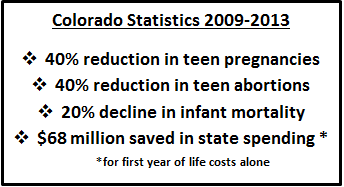Greta Klingler, the family planning supervisor for the Colorado public health department, gave two talks in Arizona last week at Salons hosted by Arizona Family Health Partnership. Klingler spoke about Colorado’s initiative to provide free contraceptives to young and low-income women to address the issue of unplanned pregnancies. Her work in this field aligns with AFHP’s mission to provide contraceptive access to women and families and provided a model for how Arizona could implement evidence-based methods of family programming to effectively improve lives.

Greta speaking in Phoenix at Francesca’s Art Gallery
In the US, 49 % of pregnancies are unintended and 25% of teen pregnancies lead to abortions. According to Child Trends Database, one out of all teen pregnancies end in abortion. Providing accessible contraceptives improves the health of communities from individual opportunities to change in systemic social issues. For young and low-income women, the ability to delay pregnancy until they are ready to start a family is one of the most significant factors in improving educational, financial, and vocational opportunities. This program in Colorado intended to equip women with greater agency in their reproductive life plan by reducing both unintended births which in turn decreases abortions.

Board President Hilary Mahoney
The program began in 2008 and a follow-up over 6 years of the study revealed incredible results in meeting the goal to reduce unintended pregnancy. From 2009 – 2013 teen birthrates fell by 40% and abortion rates fell by 42%. The demographic of unmarried women under 25 who have not graduated from college experienced similar results.
These significant rates of change came at the hands of an approach to actively engage women in making effective reproductive choices. Many women in the target age demographic desire to delay pregnancy for five or more years, which makes them ideal candidates for LARCS (long acting reverse contraceptive) such as IUDs and hormonal implants. Klingler explained that women received counselling directly following their first birth and in many cases left the hospital with their new baby and a LARC to delay further pregnancy. This intervention alone resulted in a 60% decrease in second-time pregnancy for teen moms, which empowers women to have the opportunity to finish high school and begin their careers.

Francesca’s Art Gallery
Despite the clear and compelling evidence supporting the effectiveness of this program, the Colorado government refused to pass a bill continuing its funding. This political move reflects national trends in reproductive healthcare where policies and resources do not appropriately meet evidence-based solutions. Klingler described that the Colorado public responded to this decision through a strong media presence desiring to spread awareness and persuade legislators to support policies that address the needs of the communities. Klingler said that greater public awareness and participation in this field is critical to see effective change in providing more access and resources in family planning.

Dr. Francisco Garcia on the importance of Title X
Klingler’s presence at both the Tucson and Phoenix Salon inspired the community to see where similar programs could meet needs in Arizona. After the presentations, passionate clinicians, political advocates, and community members discussed ways that such ideas could shape future family planning directions in Arizona. We would like to thank Greta for her amazing work, her presentation, and the future potentials will arise from this collaboration.
– Annie, Intern at AFHP




